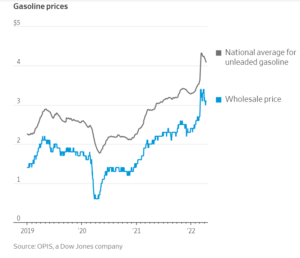In order to determine if something adds up, one must know basic arithmetic. In social matters, one must know some elementary economics. Wondering why gasoline prices haven’t decreased as fast as crude oil prices in the last few days, Rep. Diana DeGette (D., Colo.) declared:
Something just doesn’t add up.
The Wall Street Journal of yesterday had a good story on this (Collin Eaton, “Why Is Gasoline Still So Expensive if Oil Prices Have Dropped?,” Wall Street Journal, April 13, 2022). It is a story in the journalistic sense, that is, it is not heavy on theory—economic theory in that case. Yet, some economic knowledge underlies it, including explanations of how the last producer in the chain before the consumer, the service station owner, “sets” “his” price. To reformulate: he basically tries to charge what the market will bear without charging more than his competitors. The WSJ piece also shows an instructive chart, reproduced below, of the parallel movements of wholesale and retail gasoline prices.
Of course, gasoline prices don’t include only crude oil, even if it is the main component at 61%. Transportation, refining, and taxes are the other components. Crude oil, transportation, and refining include profit, which is a residual and is expected to be the normal profit in these industries given the specific market risk of each. If you think that the profits are not normal, you can make a fortune by outcompeting the “gougers” and still making a normal return on your investment. Moreover, if the thousands of crude producers and the more than one hundred refiners (only counting those localized in America) were so efficient at gouging the consumers, why would they ever decrease gasoline prices?
Who seriously believes that transferring to the state all oil fields and all other inputs necessary to produce crude oil and gasoline would reduce the final price to consumers and taxpayers? Both history and economic theory strongly suggests that politicians and their employees have been the most efficient gougers in the history of mankind.
In defense of Rep. DeGette, she is not the only politician to spread untruths. (On this very topic, see also “Gas Prices, Oil Executives Take Center Stage at Congressional Hearing,” Wall Street Journal, April 6, 2022.)
What Joseph Schumpeter said of the rationally ignorant voter applies even more to the rationally blabbing politician (see his Capitalism, Socialism and Democracy [1942-1950], an otherwise puzzling book as my anniversary review will show in the summer issue of Regulation). Schumpeter wrote:
The typical citizen drops down to a lower level of mental performance as soon as he enters the political field. He argues and analyzes in a way which he would readily recognize as infantile within the sphere of his own interests. He becomes a primitive again.

Source: Wall Street Journal


READER COMMENTS
Thomas Lee Hutcheson
Apr 14 2022 at 9:03am
What I want to know is the economic theory that blames Biden for the increase in gasoline prices. 🙂
Jose Pablo
Apr 14 2022 at 6:31pm
Everybody know (it is just common sense) that the President is responsible for all the relevant prices: energy, labor, housing, “food” (in a general sense) …
… or at least that’s what they make us believe during elections and when creating new “government agencies”.
It is a very nice kind of “poetic justice” the “President” (in general, not Biden in particular. They are pretty much all equally insufferable) being held responsible for their baseless “electoral bragging” on their ability to influence market prices.
Jose Pablo
Apr 14 2022 at 7:31pm
On second thoughts it is absolutely true (at least as true as the “shareholders are responsible for the price increase” mantra implicit in the congressional hearings”) that President Biden (in his role as “CEO of Government Inc”) is “responsible” for the price increases in energy.
Afterall the US government is pocketing around 40-50% of the proceeds of selling gas. Around 12-16 time (like in 1400% more) than the shareholders.
Thomas Lee Hutcheson
Apr 16 2022 at 8:49am
I agree. Presidents, especially Democrats, would benefit from better messaging on the economy. As soon as inflation became an issue the Biden Administration should have started “having confidence” in the Fed at the top of their lungs.
Jose Pablo
Apr 18 2022 at 7:35pm
That’s a perfect example!!
Henri Hein
Apr 14 2022 at 1:56pm
Vernon Smith did an experiment and a paper on the Rockets and Feathers phenomenon, but I can’t find it now. As I recall, his experiment showed that the pattern we see in gas prices is natural in a competitive environment.
Pierre Lemieux
Apr 15 2022 at 3:05pm
Henri: Thanks for the link. Let us know if you find anything about the Vernon Smith experiment.
Jose Pablo
Apr 14 2022 at 7:23pm
The part of the final price distributed to shareholders is, in competitive industries, very limited.
If I remember well an analysis for the airline industry (an another one for the healthcare industry) around 2-3% of the final price paid by consumers goes to the shareholders. Compare this with around 35-40% that goes to the government or 15% that goes to the employees (net of taxes paid by them).
I would not expect the figures for the competitive gas distribution industry to be very different. In fact, the “government(s) share” should be in this case even higher taking into account that some governments either produce oil or take a significant part of the proceedings thru royalties and that this is a “heavily taxed” product.
[As a “quick number” for Shell, in year 2021 out of a total revenue of 272,657 millions of dollar “only”9,000 millions (3.3%) were distributed to shareholders (dividends+repurcharses)]
This being the case, why is so prevalent the idea that price increases occur because shareholders “gouge”? Even if they were having a 100% increase in the “money they take home” prices would go up but, roughly, 2%. A 5% increase in taxes (or a 12% increase in salaries) would have the same effect on prices (ceteris paribus)
Why, then, increasing taxes or salaries (for instance in Starbucks) is not seen as “gouging” by workers or the government?
Pierre Lemieux
Apr 15 2022 at 3:17pm
Jose: Very good question in your last paragraph! But I would emphasize for our readers that the question depends on the assumption that shareholders can just decide to increase their gross profit margin by X%, which is precisely why your question is unanswerable by somebody who does believe this. In reality, contrary to taxes, wages, or other costs, profits is a residual: shareholders get whatever is left in the pot or pay whatever amount by which the pot (shareholders’ equity) is depleted.
Jose Pablo
Apr 18 2022 at 7:49pm
The shareholders “agents” in charge of managing the companies’ day to day, certainly try to increase profits as much as they can. Which I find amazing is that “people” believe they successfully do so to an extent that has no connection with reality. The shareholders takings are very rarely more than 2-5% of the final price but if you ask the laymen about this, they take home most of the final price.
On the other hand, “people” don’t believe that the Government (or the employees) also try to maximize the money they take out of the private companies. They do, an amazingly enough these two agents do so (extracting a significant part of the price paid by clients) to a much more significant extent: on average 10 times more successfully in the case of the government and 5 times in the case of the employees!!
Comments are closed.